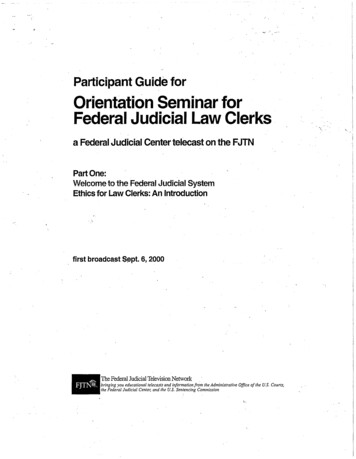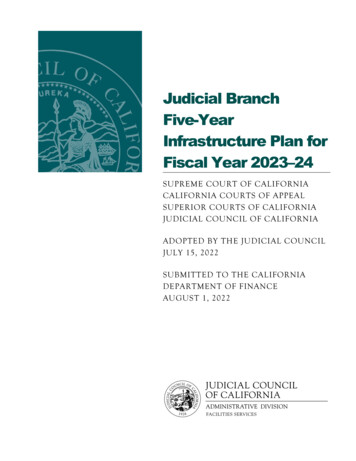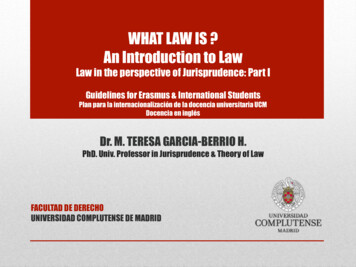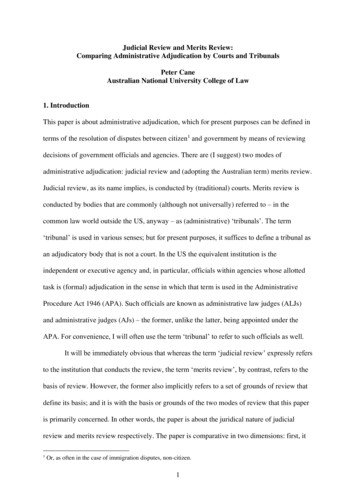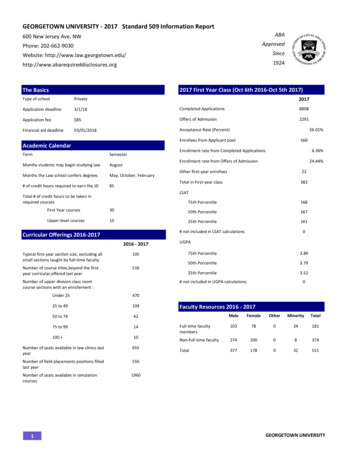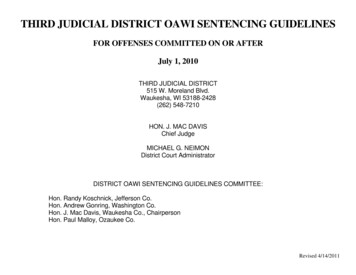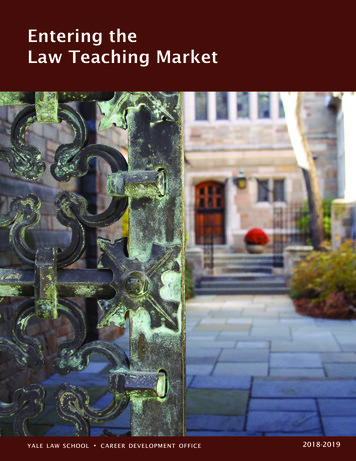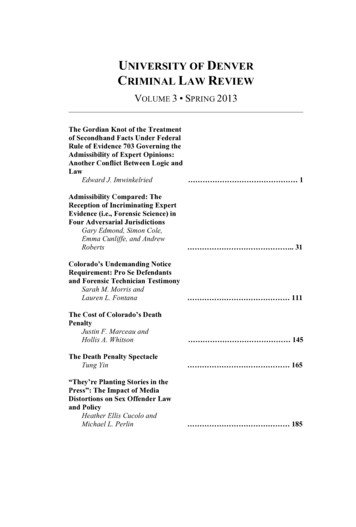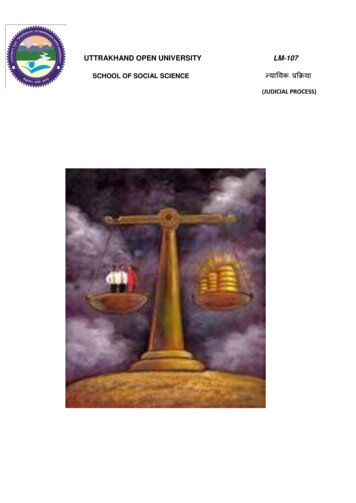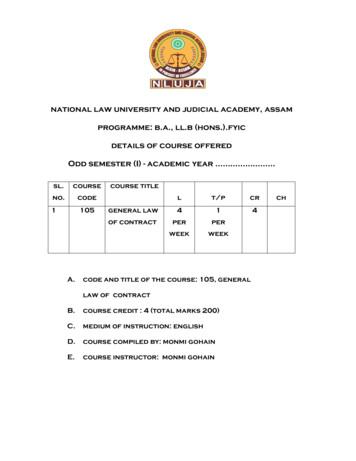
Transcription
national law university and judicial academy, assamprogramme: b.a., ll.b (hons.).fyicdetails of course offeredOdd semester (I) - academic year sl.courseno.code1105A.course titlelt/pcrgeneral law414of contractperperweekweekcode and title of the course: 105, generallaw of contractB.course credit : 4 (total marks 200)C.medium of instruction: englishD.course compiled by: monmi gohainE.course instructor: monmi gohainch
1. COURSE OBJECTIVESThe Course content of paper on Contract – I consists of Sections 1-75 of the Indian Contractact of 1872 and Specific Relief Act 1963 as ammended in october 2018. Sections 1-75 ofthe the Indian Contract Act 1872 comprises of The General Principles of Law of Contractsapplicable to all kinds of Contracts. Law of Contract is the law relating to reciprocalpromises made voluntarily by the parties having proper understanding and forming rationaljudgements. It determines the circumstances in which promises made by the parties arelegally binding on them unless it is excused or altered. It fixes liabilities for the breach ofpromise and provides damages and compensation for the breach of promises under IndianContract Act of 1872 and specific relief act 1963.The main aim of the course is designed to equip the students with essentials of each sectionof the Indian Contract Act 1872 and Specific Relief Act 1963 by way of breaking thelanguage of the section and then analysing it and interpreting it. This process provides thestudent with proper understanding of the section and develops the skill to apply thesesections to the fact situations of life.The aim and objectives of the course curriculum are the followings:1.To inform the students about the frontier areas of law on contract and specificreliefs2.To update and keep them abreast of legal developments both on IndianContract Act and Specific Relief Act.3.To make the students understand the sections enumerated in Indian ContractAct and Specific Relief Act and further to inculcate in them the skill toanalyse the sections and interpret these.4.To make them understand the case laws on contract and specific relief andthen to apply these laws to the present day fact situations.5.To equip them with the knowledge of the Doctrines and Principles of lawof contracts and specific relief provided in the Statutes
2.TEACHING METHODOLOGYThe teaching methodology for the above subject will be aim at gaining maximum theoreticalas well as practical knowledge about the above subject. Different methods will be used whichwill help the students to be engaged in the subject apart from classroom teaching. Theengagement of the students in the teaching learning process will be helpful for both thestudent and the teacher to carry on with the subject. It will be in the form of class roomteaching and explanation of basic concepts by the teacher. It will also consists of assignmentof seminar topics to the students, presentation assignment to the students , groupdiscusssiuons, organization of quiz etc.3.EXPECTED OUTCOMES OF THE COURSEAfter completion of completion of the course the students are expected tolearn thefollowing:a. In-depth knowledge about both the theoretical as well as the practical aspect of the courseb. Take up research topics in the further study in the coursec. Take up assignments related to the course which they might come across while doinginternships and other activities.d. Organize various research and practical based activities realted to the subject aftercompletion of the course.4.COURSE EVALUATION METHODThe Course shall be assessed for 200 marks. The Evaluation Scheme would be as follows:Internal Assessment: 70% (140 marks)External Assessment: 30% (60 marks)
Sl.No.1.Internal AssessmentAssignments ( writtenpresentation mode)orin 40 marks(2 Assignments of 20 marks each)2.Seminar/Group Discussion20 marks( Topics will be announced byconcerned course teacher)3.Class Tests2x 35 70 marks( Twice in a semester)4.Attendance in class10 marks5Semester End Examination60 marks5. Detailed Structure of the Course (specifying course modules andsub-modules)MODULE ILaw relating to Formation of Contract:Law relating to formation of Contract and considerationAgreements and Contracts , Offer and Proposal ,Offer and Invitation to Treat StandardForm of Contracts, Communication, Acceptance , Revocation of Proposal andAcceptance by post, Mobile and E Commerce, Essentials of Consideration , Doctrine ofPrivity of Contract , Doctrine of Privity of Consideration , Doctrine of Privity ofContract under the English Law , Position of the Doctrine in India, Exceptions to theDoctrine of Consideration
Law relating to Capacity to contractCapacity of Minor to Contract, Age of Majority , Nature of a Minor’s Agreement ,LegalPosition of a Person of Unsound Mind , Legal Positions of Persons Otherwise“Disqualified from Contracting” Nature and Effect of an Agreement with Person ionintheIndianLaw,PromissoryEstoppel, Scope of the Doctrine of Promissory EstoppelMODULE IILaws relating to Consent:Definition of Free Consent, Factors Vitiating Free Consent, Coercion, Undueinfluence, Fraud Misrepresentation, Mistake, Void Agreements , AgreementsWithout Consideration ,Agreements in Restraint of Marriage, Agreements inRestraint of Trade ,Agreements in Restraint of Legal Proceedings, UncertainAgreements ,Agreements by Way of WagerLaws relating to law of Unlawful AgreementsUnlawful Considerations and Objects ,Forbidden by Law , Defeating the Provision of AnyLaw, Fraudulent Contracts , Immoral Contracts ,Injurious to Person and Property ,ContractsOpposed to Public Policy ,Conditional Contract, Event Collateral Contract, ContingencyDependent on Act / Will of the Party, Contingency to be Condition Precedent.MODULE IIILaws relating to Performance of Contract:Contracts which must be Performed, By Whom Contracts must be Performed, Time andPlace for Performance, Performance of Reciprocal Promises, Application of Payment,Contracts which need not be performed
Laws relating to Discharge of Contract:Discharge by Performance, Modes of Discharge of Contract, Theories of Frustration ofContract, Theory of Implied Term, Just and Reasonable Solution Position in India,Effects of Frustration , Definition and theory Relating to Quasi Contract, Certainrelations resembling those created by contract.MODULE IVLaws Relating To Remedies for Breach of ContractsDamages, Remoteness of Damages and Measure of Damages, Liquidated Damages andPenalty.Specific Relief Act, 1963Measuring and Nature of Specific Reliefs, Recovery of Possession of Property, SpecificPerformance of Contracts, Rectification of Instruments, Rescission of Contracts,Cancellation of Instruments.PESCRIBED READINGS:1. S.S. Srivastava, LAW OF CONTRACT I&II, 4th Ed. 2011.2. Avtar Singh, CONTRACT & SPECIFIC RELIEF, 10thEd. 2008. Reprinted, 2010.3. Robert Duxbury, ”CONTRACT LAW”, Sweet And Maxwell, South Asian Edition,London, 20134. P S.Narayan,”LAW OF SPECIFIC RELIEF,” Asia Law House, Hyderbad, 8th Ed, 2013.5. Linda Mulchary,” CONTRACT LAW IN PERSPECTIVE”, Routledge Publication, 5thed ,20146. V. Kesava Rao,” CONTRACT I: CASES AND MATERIALS”, Lexis NexisButterworth’s, 20147. Micheal Firmstone,”THE LAW OF CONTRACT”, Lexis Nexis Butterworth’s, 20148. Kailash Rai,”CONTRACT I” Central Law Publications, Allahabad, 2nd Ed. 20099. Neil Andrews,” CONTRACT LAW”, Cambridge University Press, London, 1st Ed. 201110. P S.Narayan,”LAW OF SPECIFIC RELIEF,” Asia Law House, Hyderbad, 8th ed, 2013.
11. Linda Mulchary,” CONTRACT LAW IN PERSPECTIVE”, Routledge Publication,5thed.201412. V. Kesava Rao,” CONTRACT I: CASES AND MATERIALS”, Lexis NexisButterworth’s, 201413. Micheal Firmstone,”THE LAW OF CONTRACT”, Lexis Nexis Butterworth’s,SATUTORY REFERENCESa.Indian Contract Act, 1872b.Specific Relief Act, 1963(Act No. 9 of 1872) (Sections 1-75)LAW COMMISSION REPORTS:a.13th Report (1958) on “Contract Act”.b.103 Report (1984) on “Unfair terms in Contract”.c.119 Report (2006) on “Unfair (Procedural and Substantive) terms in Contract”.d.108 Report (1984) on “Promissory Estoppel.”e.97th Report (1984) On “Section 28, Indian Contract Act, 1872: Prescriptive Clauses InContracts.”CASE LAWS:(1942)1 All ER 220(1913)11 All LJ 489(1833)4 B & Ad 621.(1925)AC 445.(1919)2 KB 571(1969)All ER 616Upton Rural District Council v Powell.Lalman Shukla v Gauri DattWilliams v CarwardineRose and Frank Co v JR Crompton & BrosLtdBalfour v Balfour.Jones v Padavatton.
(1970)2 All ER 760(1888)21 QBD 424Meritt v Meritt.Mc Gregor v Mc Gregor.(1955)3 All ER 10(1988)3 SCC 562(1973)1 SCC 294(1605)75 ER 982(1893)1QB 256Simpkins v Pays.CWT v Abdul Hussain Mulla Md Ali.Banwari Lal v Sukhdarshan Dayal.Weeks v Tybald.Carlill v Carbolic Smoke Ball Co.AIR 1925 All 539Harbhajan Lal v Harcharan Lal.(1873)29 LT 271Tinn v Hoffmann.(1893) AC 552Harvey v Facey.AIR 1951 184: 1951 SCRMc Pherson v Appana.161ikanda Biswal v BhubaneshwarDevelopment Authority .AIR 2006 Ori 36Moses v Macferlan(1760) 2 Burr 1005Sinclair v Braougham( 1914) AC 398Munni Bibi v Triloki Nath(1913) 54 All 140Damodara Mudaliar v Secy of State forIndia(1894) 18 Mad 88
Chikham Amiraju v Chikham SheshammaWilliams v Bayley(1866) LR 1 HL 200(1934)1 KB 380Chand Singh v Ram Kaur(1987)2 Punj LR 70Raghunath Prasad v Sarju PrasadAIR 1924 PC 60Lancashire Loans Ltd v BlackShubash Chandra Das v Ganga PrasadAIR 1967 SC 878Moonshee Buzloor Raheem vShumshoonissa Begum(1913) 41 IA 23Oriental Bank Corporation v John Fleming(1879) 3 Bom 242Edgington v Fitzmaurice(1885)29 Ch D 459Commisioner of Income Tax v. Bhopal Textiles AIR 1961 SC 426LtdGauri Shankar v. MoolchandAIR 1958 MP 415Bhagwandass v. State of Madhya PradeshAIR 1966 MP 95Moss v. Hancock(1878) 2 QB 111Hooper v. Gumm(1867) LR 2 CR 282R v. White(1853) 6 Cox 213Harhandrai v. PragdasAIR 1923 PC 51Gangasaran v. Ramchandra GopalAIR 1952 SC 9
Hilas and Co. Ltd v, Acros LtdHowell v. Coupland(1932) All ER Rep 4949 QBD 462Amarnath Nikkuram v. Mohansingh SurjanSinghAIR 1954 MP 134Grant v. Australian Knitting Mills1936 AC 85Mackenzie and Co. v. Nagendra NathILR (1946) 1 Cal 225Kishan Chand v. Ram Pratap(1923) 2 KB 500 CANavin Chandra v Yogendra NathAIR 1967 All 293Startup v MacDonald(1843) 6 Man & G. 593Demby Hamilton v Burden(1949) 1 All ER 435Mukundas Raja v The State Bank of HyderbadAIR 1971 SC 449Devi Lal v Himat RamAIR 1973 Raj 39Shakuntala Devi v Mohan LalAIR 1994 Raj 59 With v O’ Flanagan(1936) 1 All ER 727Derry v Peek(1889) 14 App Cas 337Haji Ahmad Yarkhan v Abdul Ghani KhanAIR 1937 Nag 270Boulton v Jones(1857) 2 H.& N. 564Philips v Brooks(1919) 2 KB 243Ingram v Little(1961) 1 QB 198Banarsi Das v ShakuntalaAIR 1989 Del 184Ram Sewak v Ram CharanAIR 1983 All 177
Jai Ram v Kanha RamAIR 1963HP 3Union of India v Amar Singh(1960) 2 SCR 75Sales Tax Officer, Banaras v Kanhaiya LalMukundLal SarafCharter v Sullivan1959 SCR 1350Ram Kumar v Lakshmi NarayanAIR 1947 Cal 157Victor Laundry( Windsor) Ltd v NewmanIndustries Ltd(1949) 2 KB 528 CAPannalal Jankidas v MohanlalAIR 1951 SC 144Hochester v De La TourCourt of Queen’sBench,1853Frost v Knight(1872) LR 7 Exch 111( 1854) 9 Ex 340White & Carter( Council) Ltd v McGregor(1962) AC 413Sumpter v Hedges(1898) 1QB 673 CAMurlidhar Chatterjee v International Film Co.AIR 1943Harnanai v PragdasAIR 1923 PC 54Ranchoddas v Nathumal51 Bom L 491Harbaksh Singh Gill v v Ram RatanAIR 1988 P&H 60Bashir Ahmed v Government of AndhraPradeshR.Velllammal v R DaivasigamaniAIR 1952 All 506Jamal v Moola Dawood Sons & CoILR (1916) 43 Cal 493AIR 1959 Mad 283
Law of Contract is the law relating to reciprocal promises made voluntarily by the parties having proper understanding and forming rational judgements. It determines the circumstances in which promises made by the parties are legally binding on them unless it is excused or altered. It fixes liabilities for the breach of promise and provides damages and compensation for the breach of promises .
